20 DET Level 5 Diploma in Education and Training Assignment Report
VerifiedAdded on 2019/09/22
|21
|5657
|10809
Report
AI Summary
This assignment, prepared for a DET Level 5 Diploma in Education and Training, examines key concepts and practices within the field. The report begins with a presentation addressing professionalism and dual professionalism in training and education, emphasizing the importance of teacher skills and knowledge. It then delves into the economic, social, and political factors influencing education policies and their impact on curriculum and teaching. The assignment further explores the roles of stakeholders and external bodies in education, emphasizing accountability and partnership. Finally, it analyzes organizational requirements, quality assessment, and improvement arrangements, including the role of self-assessment and learner feedback within QCC College Care Training Services. The assignment concludes with an analysis of areas for enhancement in the learning program, considering evaluation results.
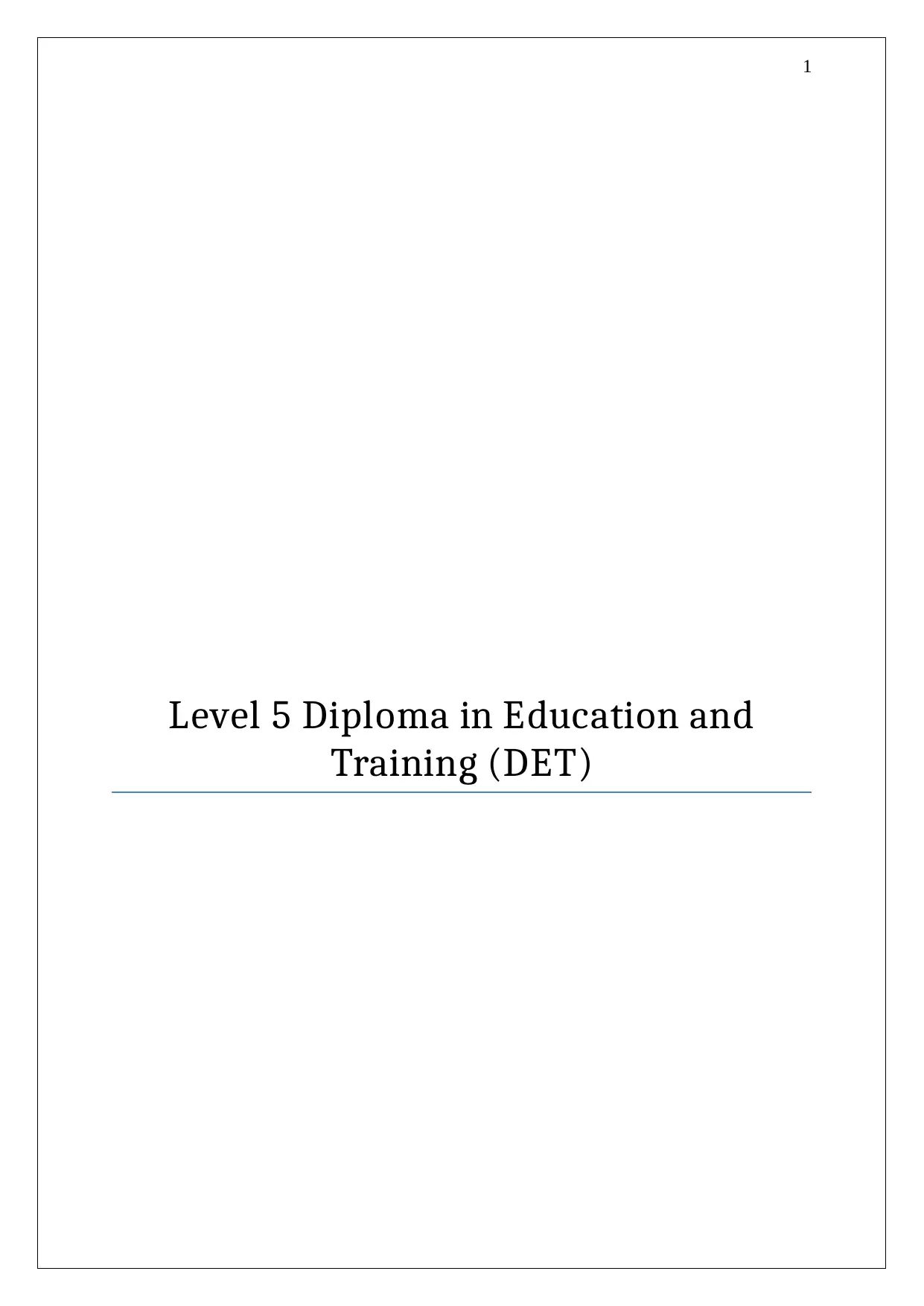
1
Level 5 Diploma in Education and
Training (DET)
Level 5 Diploma in Education and
Training (DET)
Paraphrase This Document
Need a fresh take? Get an instant paraphrase of this document with our AI Paraphraser
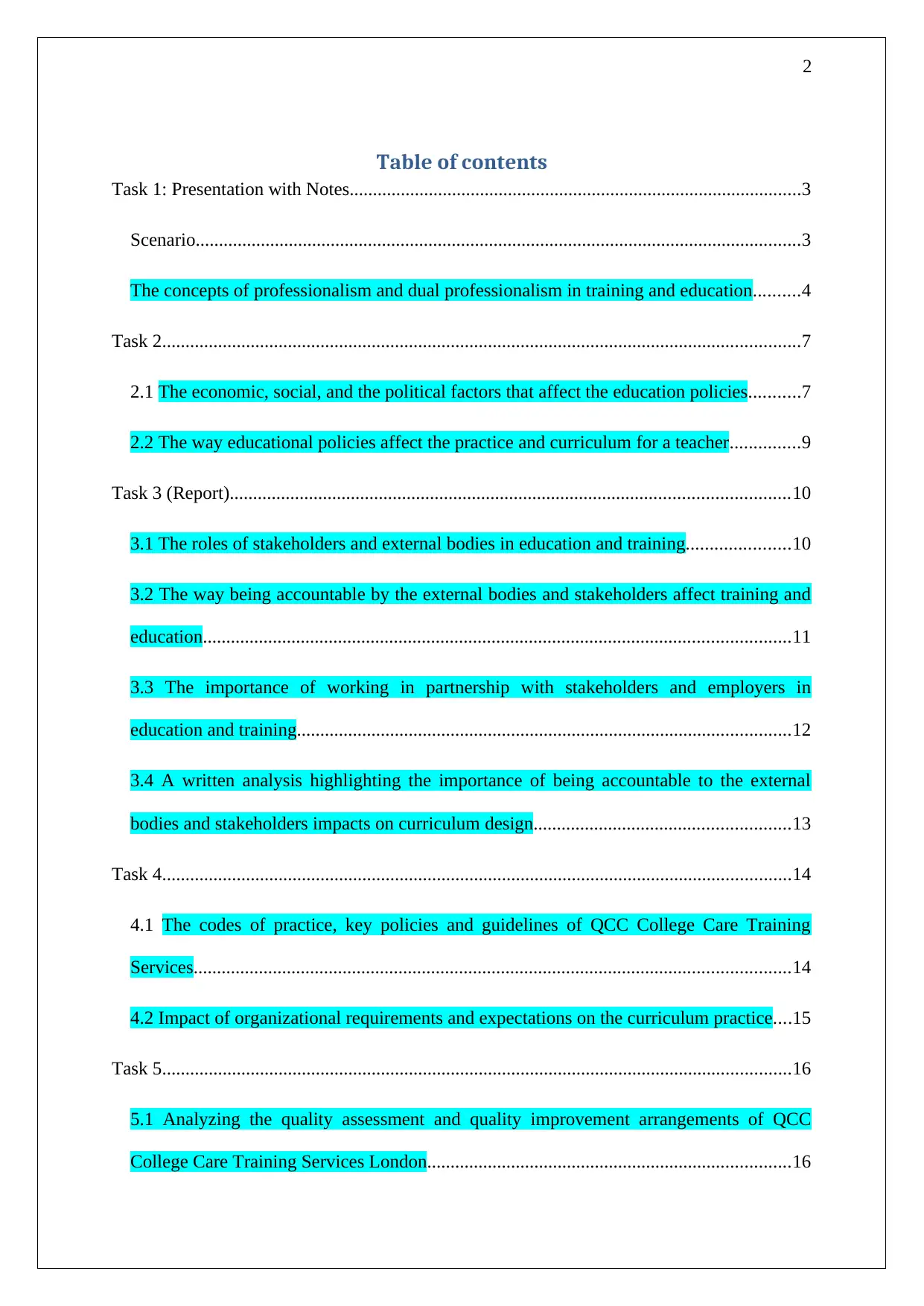
2
Table of contents
Task 1: Presentation with Notes.................................................................................................3
Scenario..................................................................................................................................3
The concepts of professionalism and dual professionalism in training and education..........4
Task 2.........................................................................................................................................7
2.1 The economic, social, and the political factors that affect the education policies...........7
2.2 The way educational policies affect the practice and curriculum for a teacher...............9
Task 3 (Report)........................................................................................................................10
3.1 The roles of stakeholders and external bodies in education and training......................10
3.2 The way being accountable by the external bodies and stakeholders affect training and
education..............................................................................................................................11
3.3 The importance of working in partnership with stakeholders and employers in
education and training..........................................................................................................12
3.4 A written analysis highlighting the importance of being accountable to the external
bodies and stakeholders impacts on curriculum design.......................................................13
Task 4.......................................................................................................................................14
4.1 The codes of practice, key policies and guidelines of QCC College Care Training
Services................................................................................................................................14
4.2 Impact of organizational requirements and expectations on the curriculum practice....15
Task 5.......................................................................................................................................16
5.1 Analyzing the quality assessment and quality improvement arrangements of QCC
College Care Training Services London..............................................................................16
Table of contents
Task 1: Presentation with Notes.................................................................................................3
Scenario..................................................................................................................................3
The concepts of professionalism and dual professionalism in training and education..........4
Task 2.........................................................................................................................................7
2.1 The economic, social, and the political factors that affect the education policies...........7
2.2 The way educational policies affect the practice and curriculum for a teacher...............9
Task 3 (Report)........................................................................................................................10
3.1 The roles of stakeholders and external bodies in education and training......................10
3.2 The way being accountable by the external bodies and stakeholders affect training and
education..............................................................................................................................11
3.3 The importance of working in partnership with stakeholders and employers in
education and training..........................................................................................................12
3.4 A written analysis highlighting the importance of being accountable to the external
bodies and stakeholders impacts on curriculum design.......................................................13
Task 4.......................................................................................................................................14
4.1 The codes of practice, key policies and guidelines of QCC College Care Training
Services................................................................................................................................14
4.2 Impact of organizational requirements and expectations on the curriculum practice....15
Task 5.......................................................................................................................................16
5.1 Analyzing the quality assessment and quality improvement arrangements of QCC
College Care Training Services London..............................................................................16
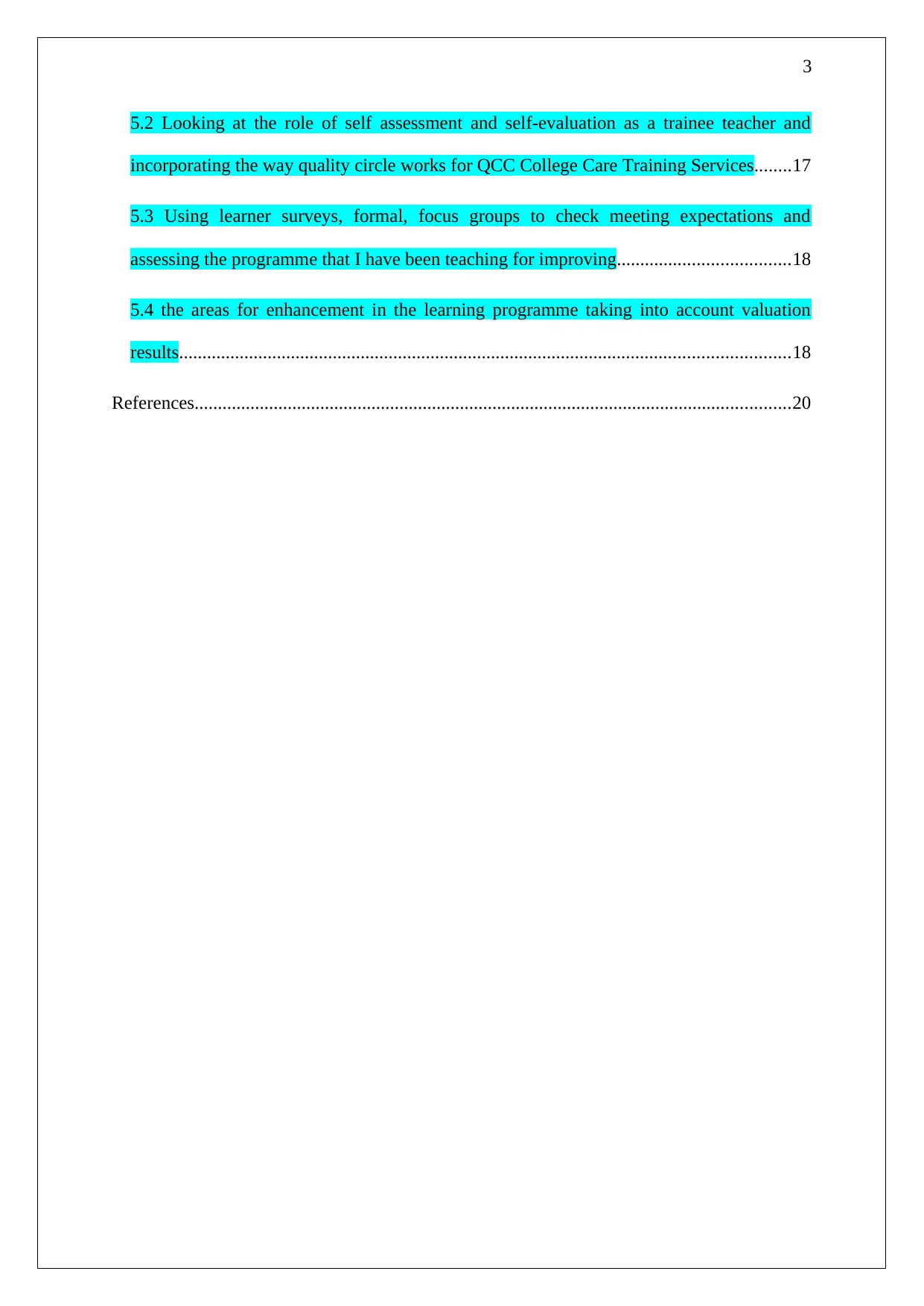
3
5.2 Looking at the role of self assessment and self-evaluation as a trainee teacher and
incorporating the way quality circle works for QCC College Care Training Services........17
5.3 Using learner surveys, formal, focus groups to check meeting expectations and
assessing the programme that I have been teaching for improving.....................................18
5.4 the areas for enhancement in the learning programme taking into account valuation
results...................................................................................................................................18
References................................................................................................................................20
5.2 Looking at the role of self assessment and self-evaluation as a trainee teacher and
incorporating the way quality circle works for QCC College Care Training Services........17
5.3 Using learner surveys, formal, focus groups to check meeting expectations and
assessing the programme that I have been teaching for improving.....................................18
5.4 the areas for enhancement in the learning programme taking into account valuation
results...................................................................................................................................18
References................................................................................................................................20
⊘ This is a preview!⊘
Do you want full access?
Subscribe today to unlock all pages.

Trusted by 1+ million students worldwide
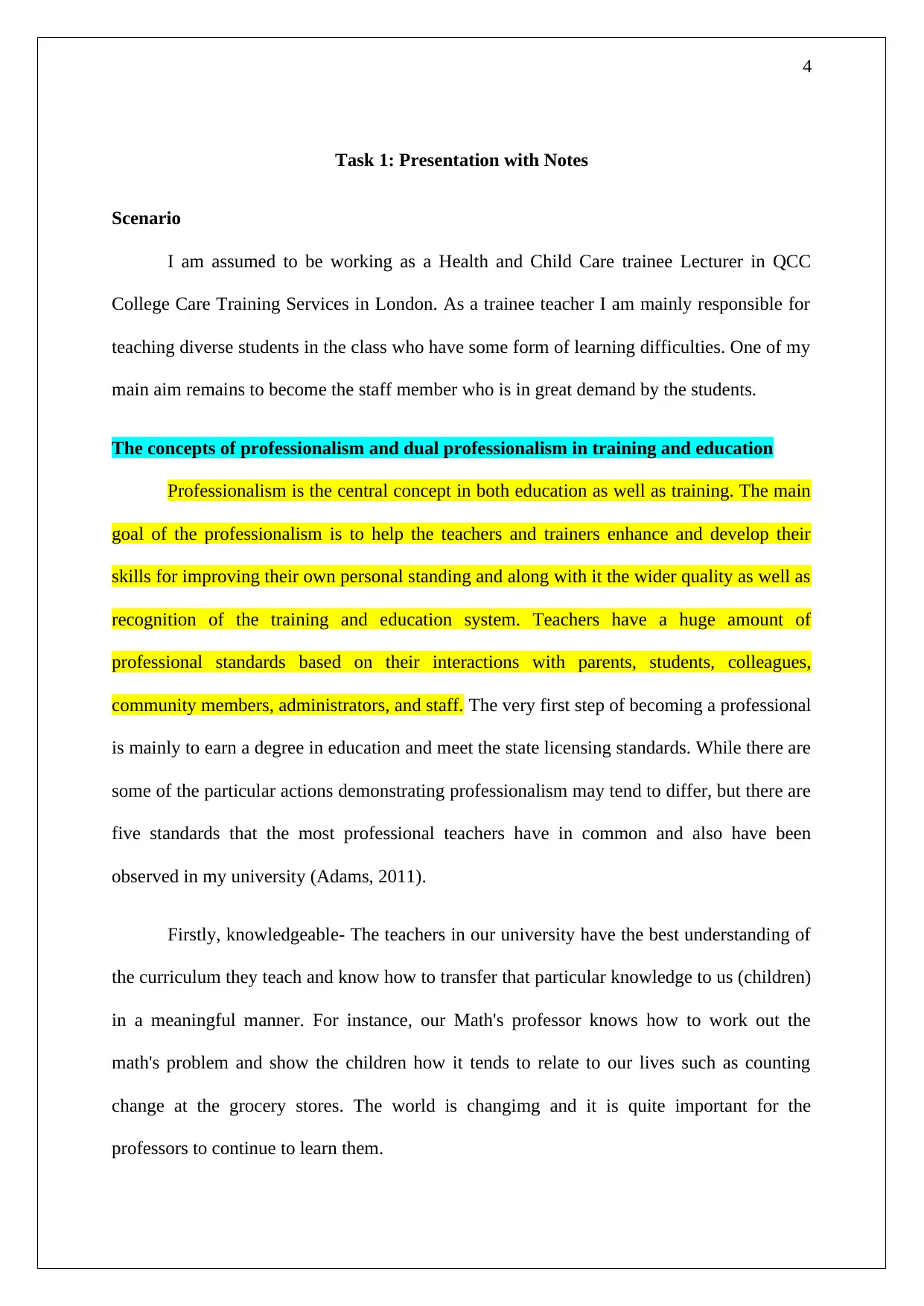
4
Task 1: Presentation with Notes
Scenario
I am assumed to be working as a Health and Child Care trainee Lecturer in QCC
College Care Training Services in London. As a trainee teacher I am mainly responsible for
teaching diverse students in the class who have some form of learning difficulties. One of my
main aim remains to become the staff member who is in great demand by the students.
The concepts of professionalism and dual professionalism in training and education
Professionalism is the central concept in both education as well as training. The main
goal of the professionalism is to help the teachers and trainers enhance and develop their
skills for improving their own personal standing and along with it the wider quality as well as
recognition of the training and education system. Teachers have a huge amount of
professional standards based on their interactions with parents, students, colleagues,
community members, administrators, and staff. The very first step of becoming a professional
is mainly to earn a degree in education and meet the state licensing standards. While there are
some of the particular actions demonstrating professionalism may tend to differ, but there are
five standards that the most professional teachers have in common and also have been
observed in my university (Adams, 2011).
Firstly, knowledgeable- The teachers in our university have the best understanding of
the curriculum they teach and know how to transfer that particular knowledge to us (children)
in a meaningful manner. For instance, our Math's professor knows how to work out the
math's problem and show the children how it tends to relate to our lives such as counting
change at the grocery stores. The world is changimg and it is quite important for the
professors to continue to learn them.
Task 1: Presentation with Notes
Scenario
I am assumed to be working as a Health and Child Care trainee Lecturer in QCC
College Care Training Services in London. As a trainee teacher I am mainly responsible for
teaching diverse students in the class who have some form of learning difficulties. One of my
main aim remains to become the staff member who is in great demand by the students.
The concepts of professionalism and dual professionalism in training and education
Professionalism is the central concept in both education as well as training. The main
goal of the professionalism is to help the teachers and trainers enhance and develop their
skills for improving their own personal standing and along with it the wider quality as well as
recognition of the training and education system. Teachers have a huge amount of
professional standards based on their interactions with parents, students, colleagues,
community members, administrators, and staff. The very first step of becoming a professional
is mainly to earn a degree in education and meet the state licensing standards. While there are
some of the particular actions demonstrating professionalism may tend to differ, but there are
five standards that the most professional teachers have in common and also have been
observed in my university (Adams, 2011).
Firstly, knowledgeable- The teachers in our university have the best understanding of
the curriculum they teach and know how to transfer that particular knowledge to us (children)
in a meaningful manner. For instance, our Math's professor knows how to work out the
math's problem and show the children how it tends to relate to our lives such as counting
change at the grocery stores. The world is changimg and it is quite important for the
professors to continue to learn them.
Paraphrase This Document
Need a fresh take? Get an instant paraphrase of this document with our AI Paraphraser
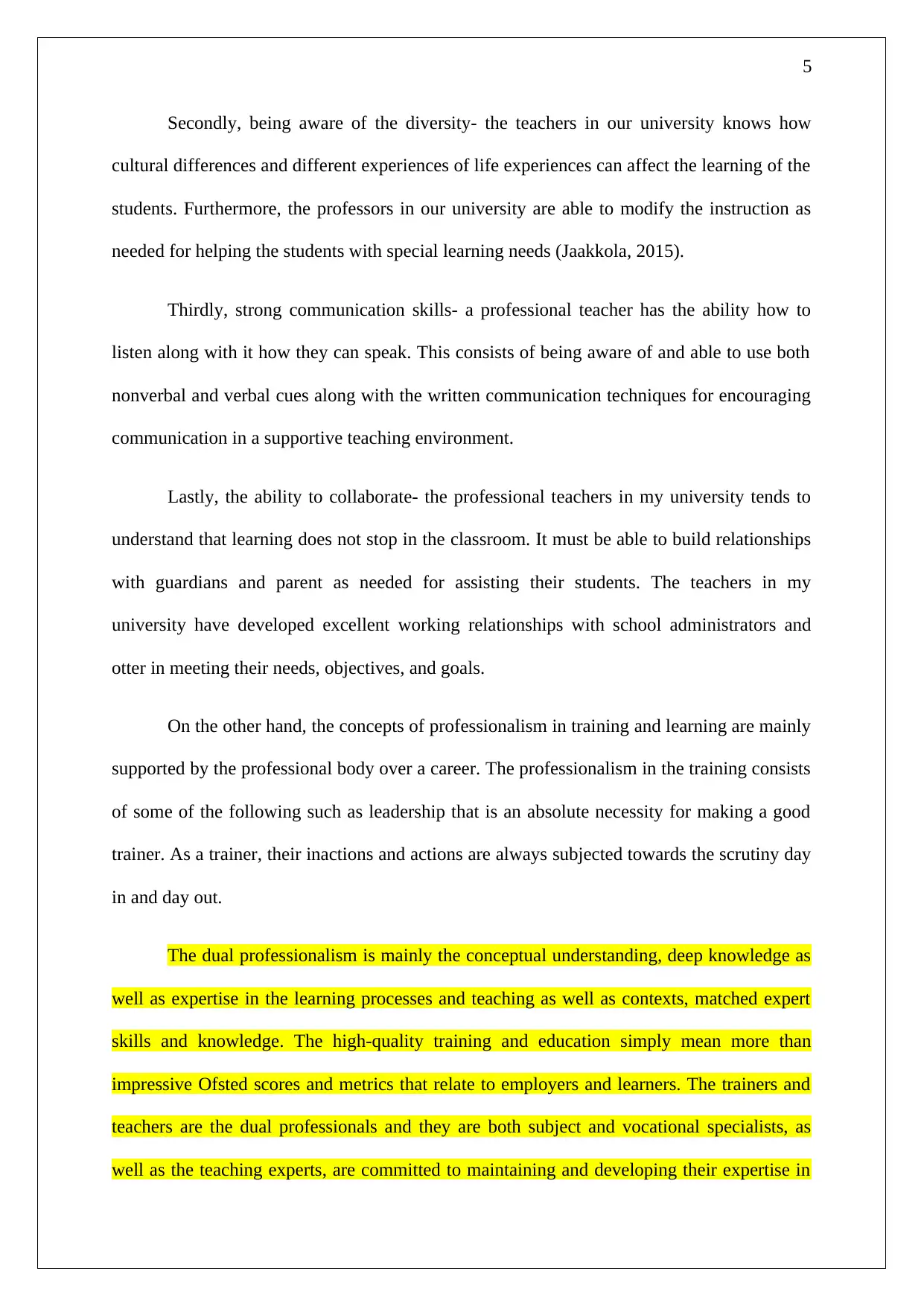
5
Secondly, being aware of the diversity- the teachers in our university knows how
cultural differences and different experiences of life experiences can affect the learning of the
students. Furthermore, the professors in our university are able to modify the instruction as
needed for helping the students with special learning needs (Jaakkola, 2015).
Thirdly, strong communication skills- a professional teacher has the ability how to
listen along with it how they can speak. This consists of being aware of and able to use both
nonverbal and verbal cues along with the written communication techniques for encouraging
communication in a supportive teaching environment.
Lastly, the ability to collaborate- the professional teachers in my university tends to
understand that learning does not stop in the classroom. It must be able to build relationships
with guardians and parent as needed for assisting their students. The teachers in my
university have developed excellent working relationships with school administrators and
otter in meeting their needs, objectives, and goals.
On the other hand, the concepts of professionalism in training and learning are mainly
supported by the professional body over a career. The professionalism in the training consists
of some of the following such as leadership that is an absolute necessity for making a good
trainer. As a trainer, their inactions and actions are always subjected towards the scrutiny day
in and day out.
The dual professionalism is mainly the conceptual understanding, deep knowledge as
well as expertise in the learning processes and teaching as well as contexts, matched expert
skills and knowledge. The high-quality training and education simply mean more than
impressive Ofsted scores and metrics that relate to employers and learners. The trainers and
teachers are the dual professionals and they are both subject and vocational specialists, as
well as the teaching experts, are committed to maintaining and developing their expertise in
Secondly, being aware of the diversity- the teachers in our university knows how
cultural differences and different experiences of life experiences can affect the learning of the
students. Furthermore, the professors in our university are able to modify the instruction as
needed for helping the students with special learning needs (Jaakkola, 2015).
Thirdly, strong communication skills- a professional teacher has the ability how to
listen along with it how they can speak. This consists of being aware of and able to use both
nonverbal and verbal cues along with the written communication techniques for encouraging
communication in a supportive teaching environment.
Lastly, the ability to collaborate- the professional teachers in my university tends to
understand that learning does not stop in the classroom. It must be able to build relationships
with guardians and parent as needed for assisting their students. The teachers in my
university have developed excellent working relationships with school administrators and
otter in meeting their needs, objectives, and goals.
On the other hand, the concepts of professionalism in training and learning are mainly
supported by the professional body over a career. The professionalism in the training consists
of some of the following such as leadership that is an absolute necessity for making a good
trainer. As a trainer, their inactions and actions are always subjected towards the scrutiny day
in and day out.
The dual professionalism is mainly the conceptual understanding, deep knowledge as
well as expertise in the learning processes and teaching as well as contexts, matched expert
skills and knowledge. The high-quality training and education simply mean more than
impressive Ofsted scores and metrics that relate to employers and learners. The trainers and
teachers are the dual professionals and they are both subject and vocational specialists, as
well as the teaching experts, are committed to maintaining and developing their expertise in
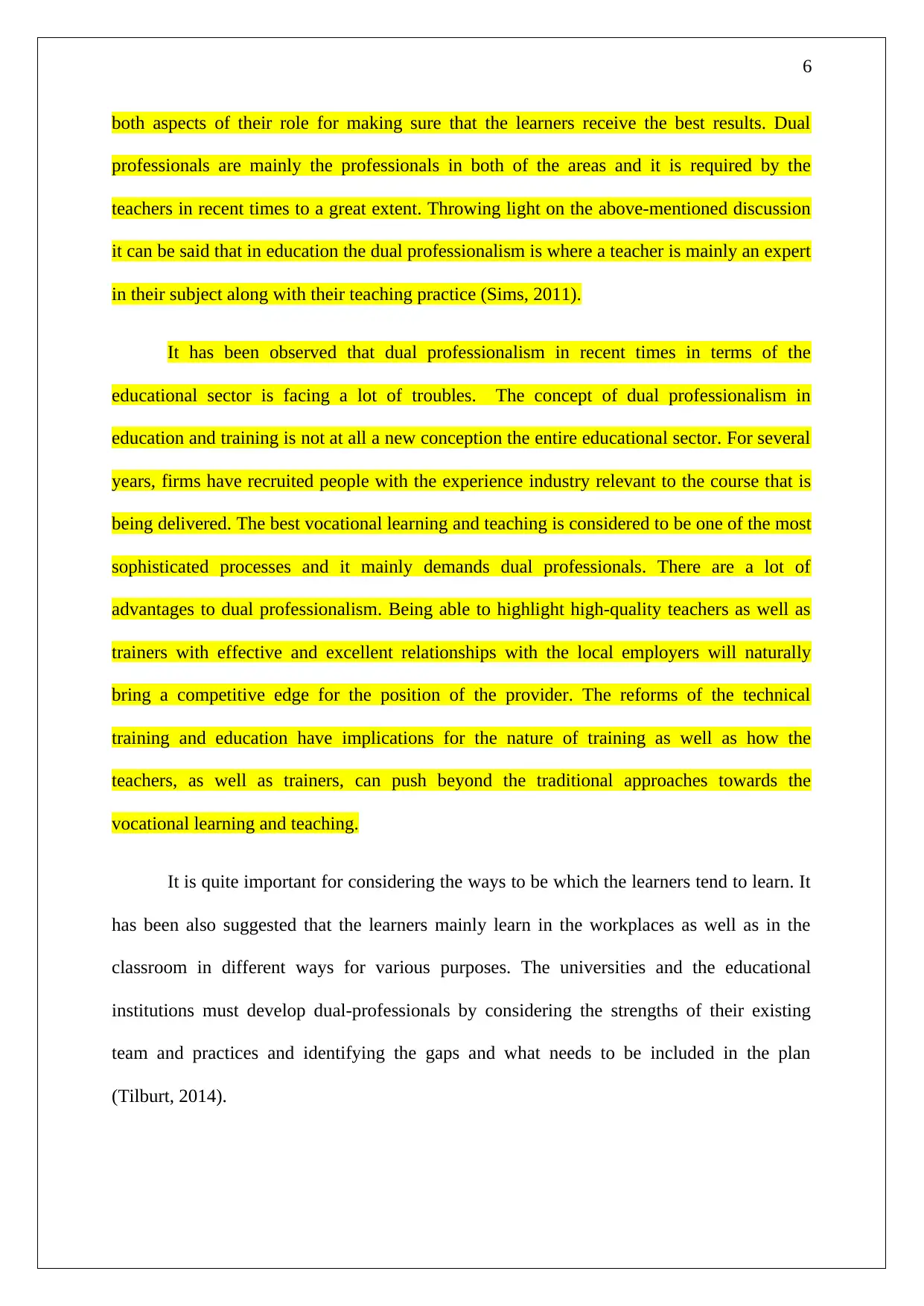
6
both aspects of their role for making sure that the learners receive the best results. Dual
professionals are mainly the professionals in both of the areas and it is required by the
teachers in recent times to a great extent. Throwing light on the above-mentioned discussion
it can be said that in education the dual professionalism is where a teacher is mainly an expert
in their subject along with their teaching practice (Sims, 2011).
It has been observed that dual professionalism in recent times in terms of the
educational sector is facing a lot of troubles. The concept of dual professionalism in
education and training is not at all a new conception the entire educational sector. For several
years, firms have recruited people with the experience industry relevant to the course that is
being delivered. The best vocational learning and teaching is considered to be one of the most
sophisticated processes and it mainly demands dual professionals. There are a lot of
advantages to dual professionalism. Being able to highlight high-quality teachers as well as
trainers with effective and excellent relationships with the local employers will naturally
bring a competitive edge for the position of the provider. The reforms of the technical
training and education have implications for the nature of training as well as how the
teachers, as well as trainers, can push beyond the traditional approaches towards the
vocational learning and teaching.
It is quite important for considering the ways to be which the learners tend to learn. It
has been also suggested that the learners mainly learn in the workplaces as well as in the
classroom in different ways for various purposes. The universities and the educational
institutions must develop dual-professionals by considering the strengths of their existing
team and practices and identifying the gaps and what needs to be included in the plan
(Tilburt, 2014).
both aspects of their role for making sure that the learners receive the best results. Dual
professionals are mainly the professionals in both of the areas and it is required by the
teachers in recent times to a great extent. Throwing light on the above-mentioned discussion
it can be said that in education the dual professionalism is where a teacher is mainly an expert
in their subject along with their teaching practice (Sims, 2011).
It has been observed that dual professionalism in recent times in terms of the
educational sector is facing a lot of troubles. The concept of dual professionalism in
education and training is not at all a new conception the entire educational sector. For several
years, firms have recruited people with the experience industry relevant to the course that is
being delivered. The best vocational learning and teaching is considered to be one of the most
sophisticated processes and it mainly demands dual professionals. There are a lot of
advantages to dual professionalism. Being able to highlight high-quality teachers as well as
trainers with effective and excellent relationships with the local employers will naturally
bring a competitive edge for the position of the provider. The reforms of the technical
training and education have implications for the nature of training as well as how the
teachers, as well as trainers, can push beyond the traditional approaches towards the
vocational learning and teaching.
It is quite important for considering the ways to be which the learners tend to learn. It
has been also suggested that the learners mainly learn in the workplaces as well as in the
classroom in different ways for various purposes. The universities and the educational
institutions must develop dual-professionals by considering the strengths of their existing
team and practices and identifying the gaps and what needs to be included in the plan
(Tilburt, 2014).
⊘ This is a preview!⊘
Do you want full access?
Subscribe today to unlock all pages.

Trusted by 1+ million students worldwide
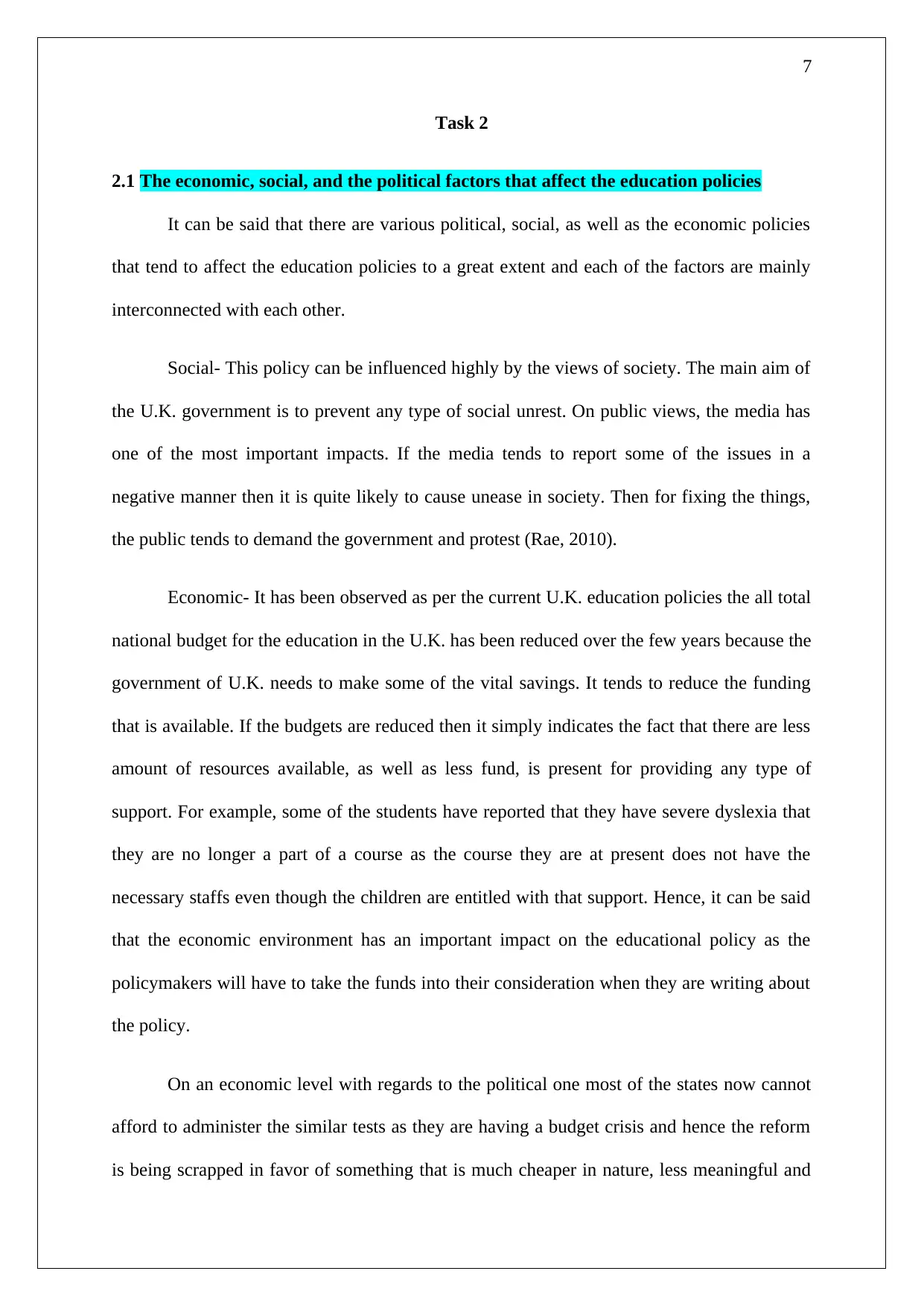
7
Task 2
2.1 The economic, social, and the political factors that affect the education policies
It can be said that there are various political, social, as well as the economic policies
that tend to affect the education policies to a great extent and each of the factors are mainly
interconnected with each other.
Social- This policy can be influenced highly by the views of society. The main aim of
the U.K. government is to prevent any type of social unrest. On public views, the media has
one of the most important impacts. If the media tends to report some of the issues in a
negative manner then it is quite likely to cause unease in society. Then for fixing the things,
the public tends to demand the government and protest (Rae, 2010).
Economic- It has been observed as per the current U.K. education policies the all total
national budget for the education in the U.K. has been reduced over the few years because the
government of U.K. needs to make some of the vital savings. It tends to reduce the funding
that is available. If the budgets are reduced then it simply indicates the fact that there are less
amount of resources available, as well as less fund, is present for providing any type of
support. For example, some of the students have reported that they have severe dyslexia that
they are no longer a part of a course as the course they are at present does not have the
necessary staffs even though the children are entitled with that support. Hence, it can be said
that the economic environment has an important impact on the educational policy as the
policymakers will have to take the funds into their consideration when they are writing about
the policy.
On an economic level with regards to the political one most of the states now cannot
afford to administer the similar tests as they are having a budget crisis and hence the reform
is being scrapped in favor of something that is much cheaper in nature, less meaningful and
Task 2
2.1 The economic, social, and the political factors that affect the education policies
It can be said that there are various political, social, as well as the economic policies
that tend to affect the education policies to a great extent and each of the factors are mainly
interconnected with each other.
Social- This policy can be influenced highly by the views of society. The main aim of
the U.K. government is to prevent any type of social unrest. On public views, the media has
one of the most important impacts. If the media tends to report some of the issues in a
negative manner then it is quite likely to cause unease in society. Then for fixing the things,
the public tends to demand the government and protest (Rae, 2010).
Economic- It has been observed as per the current U.K. education policies the all total
national budget for the education in the U.K. has been reduced over the few years because the
government of U.K. needs to make some of the vital savings. It tends to reduce the funding
that is available. If the budgets are reduced then it simply indicates the fact that there are less
amount of resources available, as well as less fund, is present for providing any type of
support. For example, some of the students have reported that they have severe dyslexia that
they are no longer a part of a course as the course they are at present does not have the
necessary staffs even though the children are entitled with that support. Hence, it can be said
that the economic environment has an important impact on the educational policy as the
policymakers will have to take the funds into their consideration when they are writing about
the policy.
On an economic level with regards to the political one most of the states now cannot
afford to administer the similar tests as they are having a budget crisis and hence the reform
is being scrapped in favor of something that is much cheaper in nature, less meaningful and
Paraphrase This Document
Need a fresh take? Get an instant paraphrase of this document with our AI Paraphraser
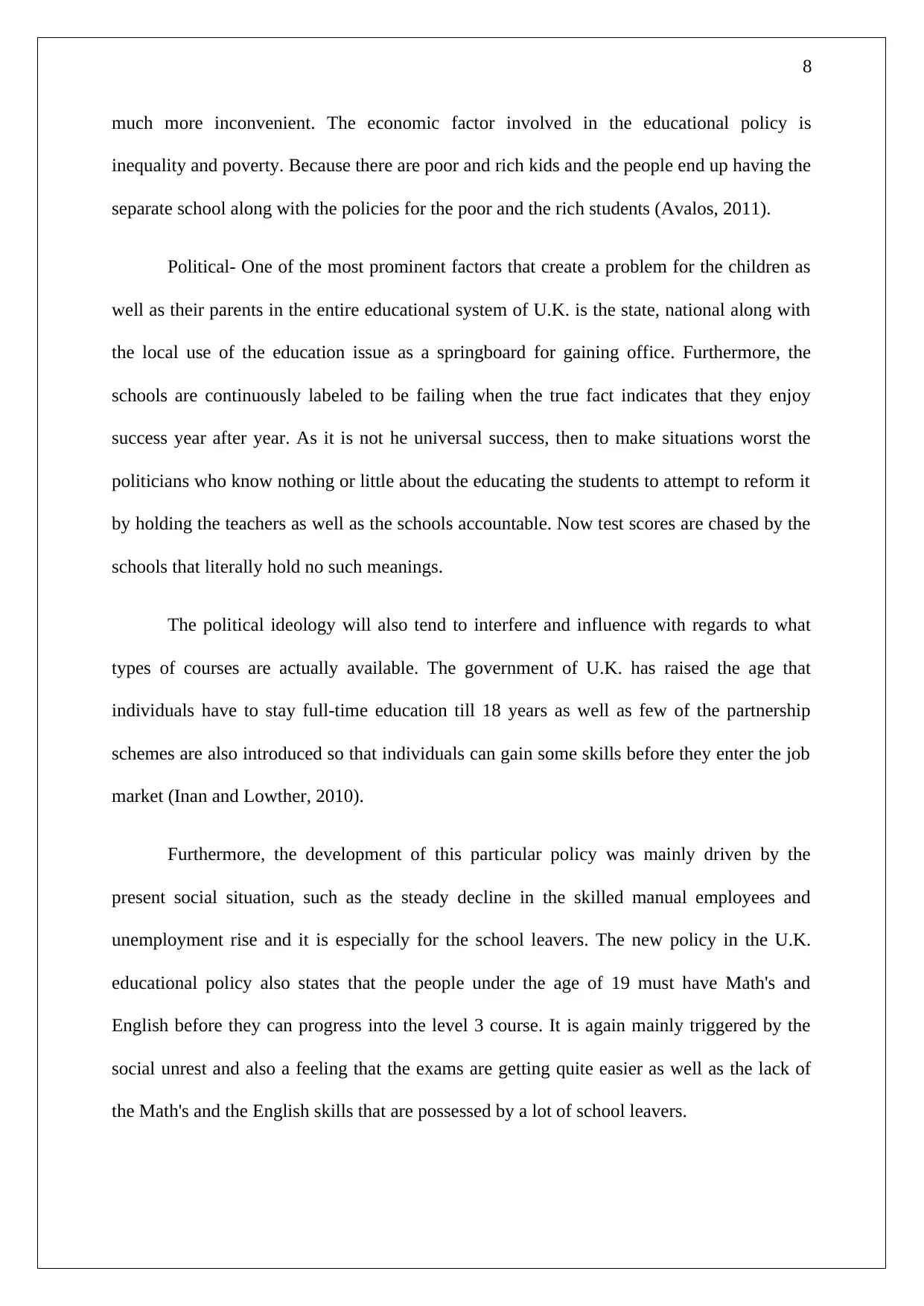
8
much more inconvenient. The economic factor involved in the educational policy is
inequality and poverty. Because there are poor and rich kids and the people end up having the
separate school along with the policies for the poor and the rich students (Avalos, 2011).
Political- One of the most prominent factors that create a problem for the children as
well as their parents in the entire educational system of U.K. is the state, national along with
the local use of the education issue as a springboard for gaining office. Furthermore, the
schools are continuously labeled to be failing when the true fact indicates that they enjoy
success year after year. As it is not he universal success, then to make situations worst the
politicians who know nothing or little about the educating the students to attempt to reform it
by holding the teachers as well as the schools accountable. Now test scores are chased by the
schools that literally hold no such meanings.
The political ideology will also tend to interfere and influence with regards to what
types of courses are actually available. The government of U.K. has raised the age that
individuals have to stay full-time education till 18 years as well as few of the partnership
schemes are also introduced so that individuals can gain some skills before they enter the job
market (Inan and Lowther, 2010).
Furthermore, the development of this particular policy was mainly driven by the
present social situation, such as the steady decline in the skilled manual employees and
unemployment rise and it is especially for the school leavers. The new policy in the U.K.
educational policy also states that the people under the age of 19 must have Math's and
English before they can progress into the level 3 course. It is again mainly triggered by the
social unrest and also a feeling that the exams are getting quite easier as well as the lack of
the Math's and the English skills that are possessed by a lot of school leavers.
much more inconvenient. The economic factor involved in the educational policy is
inequality and poverty. Because there are poor and rich kids and the people end up having the
separate school along with the policies for the poor and the rich students (Avalos, 2011).
Political- One of the most prominent factors that create a problem for the children as
well as their parents in the entire educational system of U.K. is the state, national along with
the local use of the education issue as a springboard for gaining office. Furthermore, the
schools are continuously labeled to be failing when the true fact indicates that they enjoy
success year after year. As it is not he universal success, then to make situations worst the
politicians who know nothing or little about the educating the students to attempt to reform it
by holding the teachers as well as the schools accountable. Now test scores are chased by the
schools that literally hold no such meanings.
The political ideology will also tend to interfere and influence with regards to what
types of courses are actually available. The government of U.K. has raised the age that
individuals have to stay full-time education till 18 years as well as few of the partnership
schemes are also introduced so that individuals can gain some skills before they enter the job
market (Inan and Lowther, 2010).
Furthermore, the development of this particular policy was mainly driven by the
present social situation, such as the steady decline in the skilled manual employees and
unemployment rise and it is especially for the school leavers. The new policy in the U.K.
educational policy also states that the people under the age of 19 must have Math's and
English before they can progress into the level 3 course. It is again mainly triggered by the
social unrest and also a feeling that the exams are getting quite easier as well as the lack of
the Math's and the English skills that are possessed by a lot of school leavers.
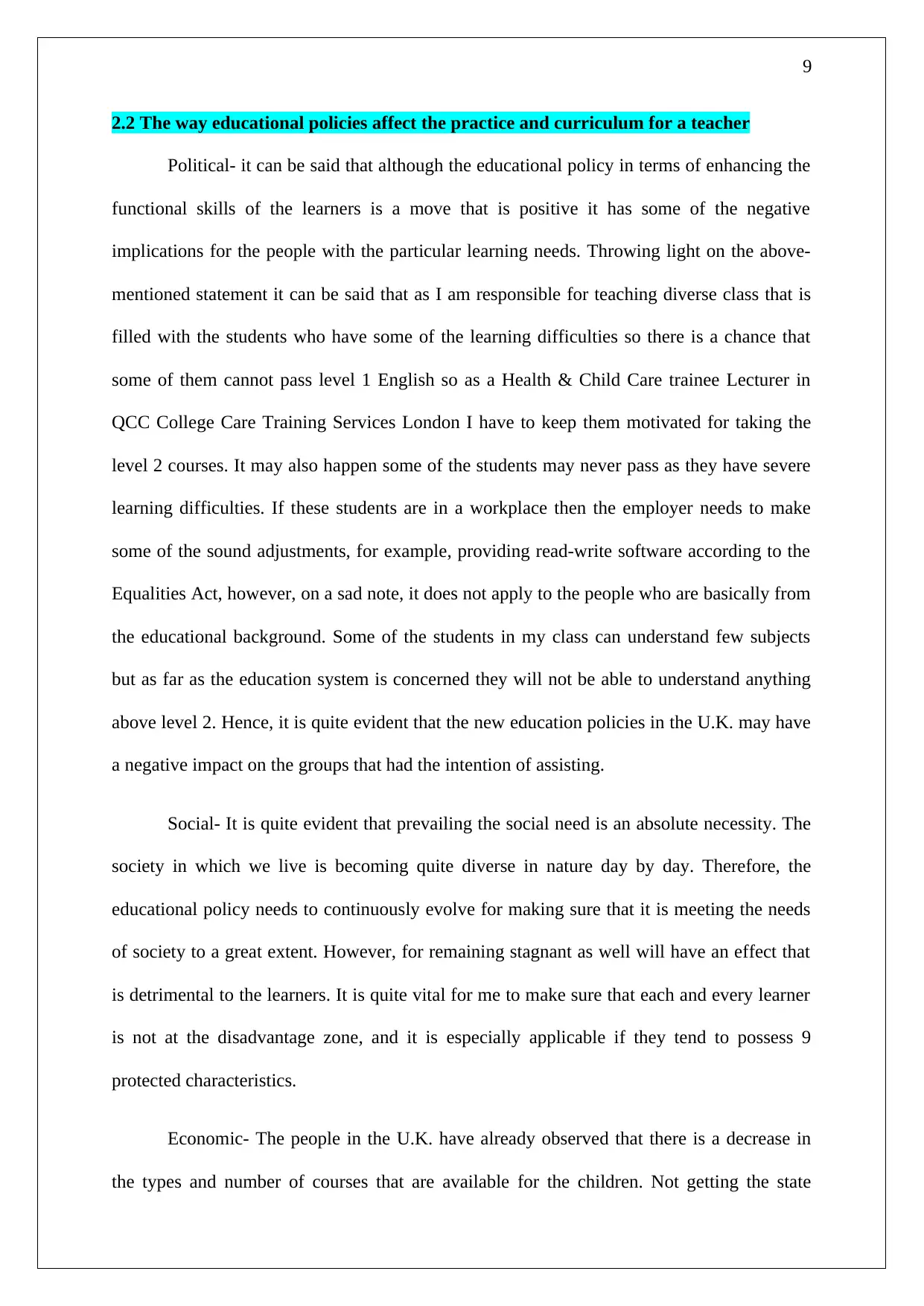
9
2.2 The way educational policies affect the practice and curriculum for a teacher
Political- it can be said that although the educational policy in terms of enhancing the
functional skills of the learners is a move that is positive it has some of the negative
implications for the people with the particular learning needs. Throwing light on the above-
mentioned statement it can be said that as I am responsible for teaching diverse class that is
filled with the students who have some of the learning difficulties so there is a chance that
some of them cannot pass level 1 English so as a Health & Child Care trainee Lecturer in
QCC College Care Training Services London I have to keep them motivated for taking the
level 2 courses. It may also happen some of the students may never pass as they have severe
learning difficulties. If these students are in a workplace then the employer needs to make
some of the sound adjustments, for example, providing read-write software according to the
Equalities Act, however, on a sad note, it does not apply to the people who are basically from
the educational background. Some of the students in my class can understand few subjects
but as far as the education system is concerned they will not be able to understand anything
above level 2. Hence, it is quite evident that the new education policies in the U.K. may have
a negative impact on the groups that had the intention of assisting.
Social- It is quite evident that prevailing the social need is an absolute necessity. The
society in which we live is becoming quite diverse in nature day by day. Therefore, the
educational policy needs to continuously evolve for making sure that it is meeting the needs
of society to a great extent. However, for remaining stagnant as well will have an effect that
is detrimental to the learners. It is quite vital for me to make sure that each and every learner
is not at the disadvantage zone, and it is especially applicable if they tend to possess 9
protected characteristics.
Economic- The people in the U.K. have already observed that there is a decrease in
the types and number of courses that are available for the children. Not getting the state
2.2 The way educational policies affect the practice and curriculum for a teacher
Political- it can be said that although the educational policy in terms of enhancing the
functional skills of the learners is a move that is positive it has some of the negative
implications for the people with the particular learning needs. Throwing light on the above-
mentioned statement it can be said that as I am responsible for teaching diverse class that is
filled with the students who have some of the learning difficulties so there is a chance that
some of them cannot pass level 1 English so as a Health & Child Care trainee Lecturer in
QCC College Care Training Services London I have to keep them motivated for taking the
level 2 courses. It may also happen some of the students may never pass as they have severe
learning difficulties. If these students are in a workplace then the employer needs to make
some of the sound adjustments, for example, providing read-write software according to the
Equalities Act, however, on a sad note, it does not apply to the people who are basically from
the educational background. Some of the students in my class can understand few subjects
but as far as the education system is concerned they will not be able to understand anything
above level 2. Hence, it is quite evident that the new education policies in the U.K. may have
a negative impact on the groups that had the intention of assisting.
Social- It is quite evident that prevailing the social need is an absolute necessity. The
society in which we live is becoming quite diverse in nature day by day. Therefore, the
educational policy needs to continuously evolve for making sure that it is meeting the needs
of society to a great extent. However, for remaining stagnant as well will have an effect that
is detrimental to the learners. It is quite vital for me to make sure that each and every learner
is not at the disadvantage zone, and it is especially applicable if they tend to possess 9
protected characteristics.
Economic- The people in the U.K. have already observed that there is a decrease in
the types and number of courses that are available for the children. Not getting the state
⊘ This is a preview!⊘
Do you want full access?
Subscribe today to unlock all pages.

Trusted by 1+ million students worldwide
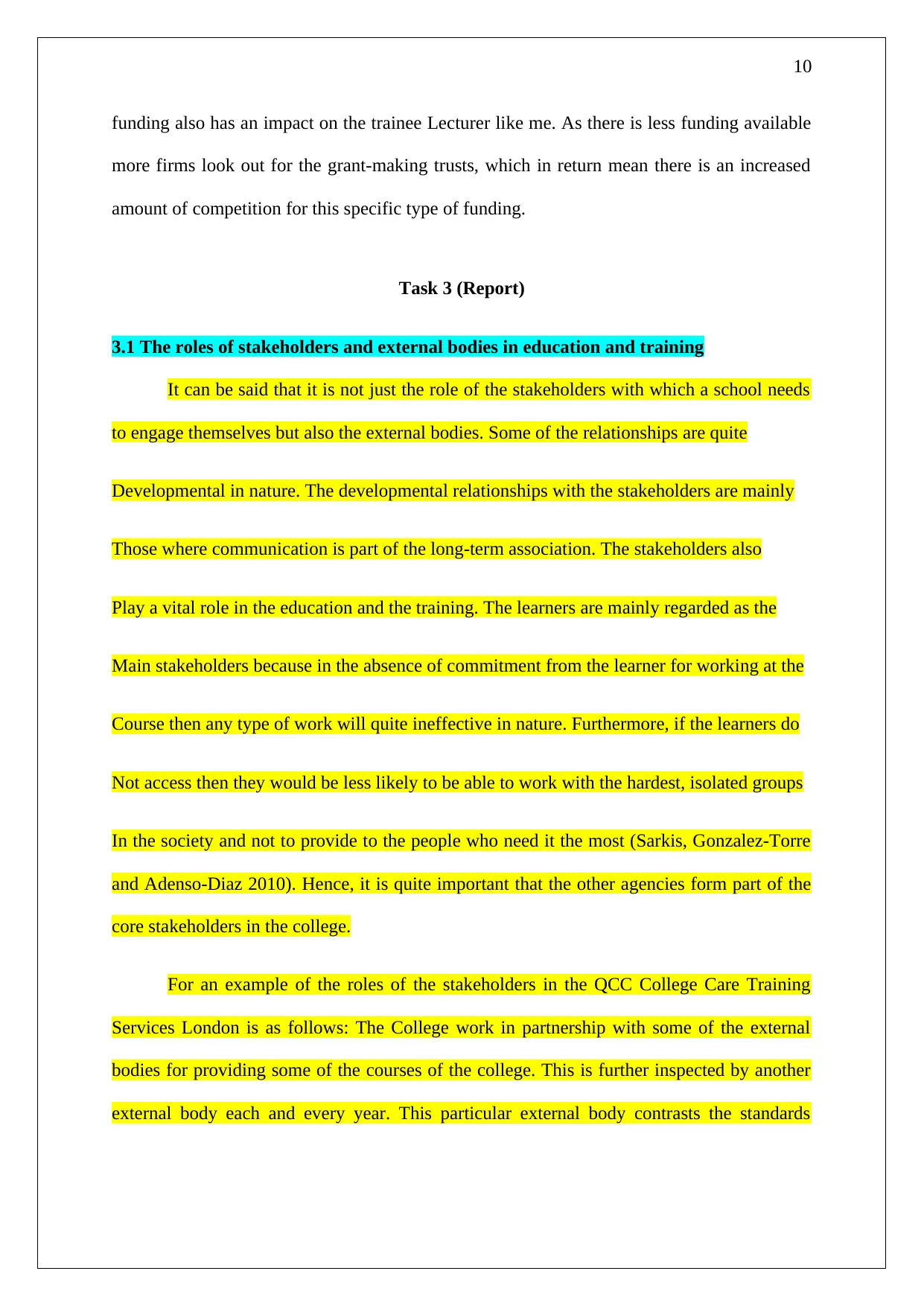
10
funding also has an impact on the trainee Lecturer like me. As there is less funding available
more firms look out for the grant-making trusts, which in return mean there is an increased
amount of competition for this specific type of funding.
Task 3 (Report)
3.1 The roles of stakeholders and external bodies in education and training
It can be said that it is not just the role of the stakeholders with which a school needs
to engage themselves but also the external bodies. Some of the relationships are quite
Developmental in nature. The developmental relationships with the stakeholders are mainly
Those where communication is part of the long-term association. The stakeholders also
Play a vital role in the education and the training. The learners are mainly regarded as the
Main stakeholders because in the absence of commitment from the learner for working at the
Course then any type of work will quite ineffective in nature. Furthermore, if the learners do
Not access then they would be less likely to be able to work with the hardest, isolated groups
In the society and not to provide to the people who need it the most (Sarkis, Gonzalez-Torre
and Adenso-Diaz 2010). Hence, it is quite important that the other agencies form part of the
core stakeholders in the college.
For an example of the roles of the stakeholders in the QCC College Care Training
Services London is as follows: The College work in partnership with some of the external
bodies for providing some of the courses of the college. This is further inspected by another
external body each and every year. This particular external body contrasts the standards
funding also has an impact on the trainee Lecturer like me. As there is less funding available
more firms look out for the grant-making trusts, which in return mean there is an increased
amount of competition for this specific type of funding.
Task 3 (Report)
3.1 The roles of stakeholders and external bodies in education and training
It can be said that it is not just the role of the stakeholders with which a school needs
to engage themselves but also the external bodies. Some of the relationships are quite
Developmental in nature. The developmental relationships with the stakeholders are mainly
Those where communication is part of the long-term association. The stakeholders also
Play a vital role in the education and the training. The learners are mainly regarded as the
Main stakeholders because in the absence of commitment from the learner for working at the
Course then any type of work will quite ineffective in nature. Furthermore, if the learners do
Not access then they would be less likely to be able to work with the hardest, isolated groups
In the society and not to provide to the people who need it the most (Sarkis, Gonzalez-Torre
and Adenso-Diaz 2010). Hence, it is quite important that the other agencies form part of the
core stakeholders in the college.
For an example of the roles of the stakeholders in the QCC College Care Training
Services London is as follows: The College work in partnership with some of the external
bodies for providing some of the courses of the college. This is further inspected by another
external body each and every year. This particular external body contrasts the standards
Paraphrase This Document
Need a fresh take? Get an instant paraphrase of this document with our AI Paraphraser
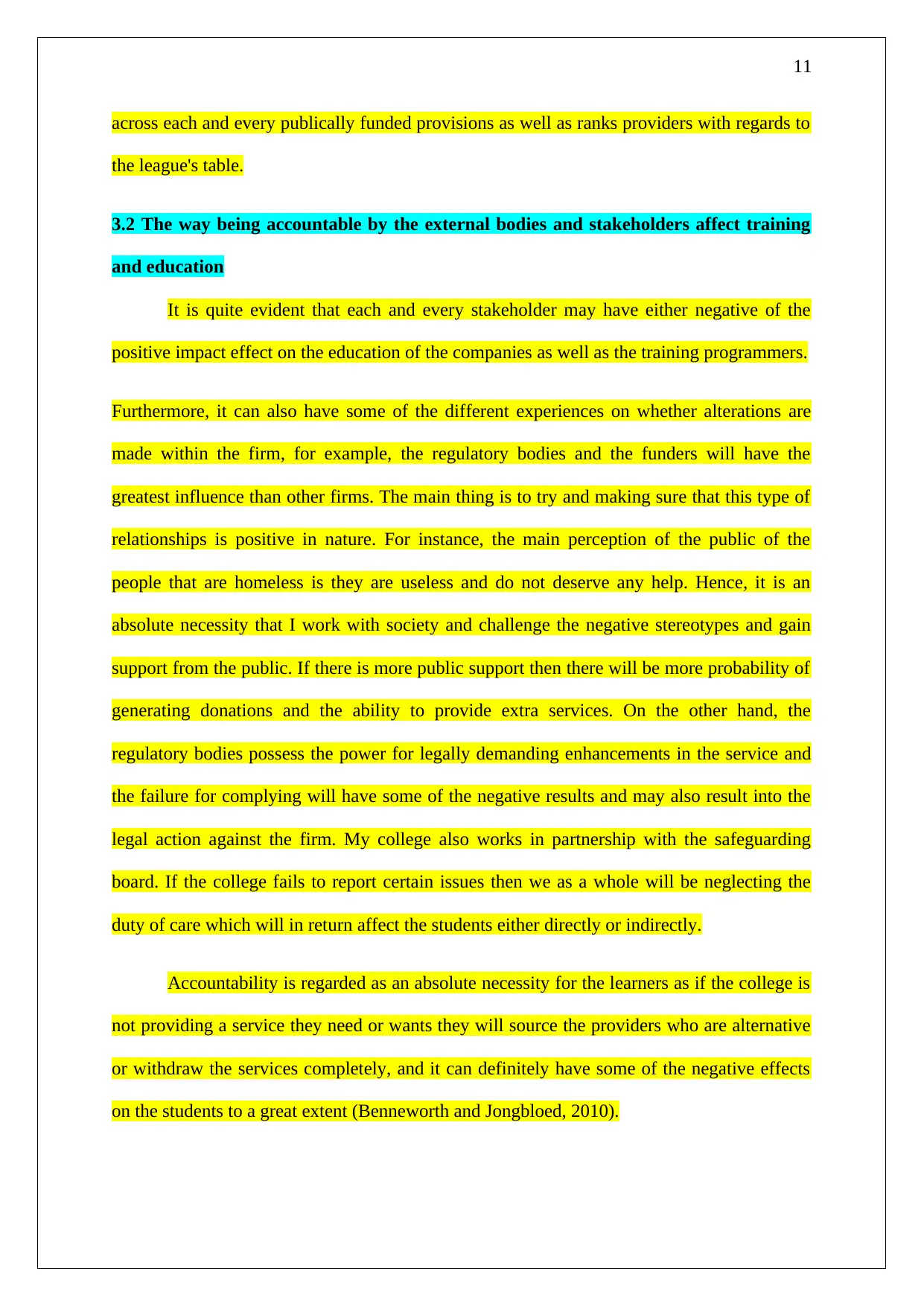
11
across each and every publically funded provisions as well as ranks providers with regards to
the league's table.
3.2 The way being accountable by the external bodies and stakeholders affect training
and education
It is quite evident that each and every stakeholder may have either negative of the
positive impact effect on the education of the companies as well as the training programmers.
Furthermore, it can also have some of the different experiences on whether alterations are
made within the firm, for example, the regulatory bodies and the funders will have the
greatest influence than other firms. The main thing is to try and making sure that this type of
relationships is positive in nature. For instance, the main perception of the public of the
people that are homeless is they are useless and do not deserve any help. Hence, it is an
absolute necessity that I work with society and challenge the negative stereotypes and gain
support from the public. If there is more public support then there will be more probability of
generating donations and the ability to provide extra services. On the other hand, the
regulatory bodies possess the power for legally demanding enhancements in the service and
the failure for complying will have some of the negative results and may also result into the
legal action against the firm. My college also works in partnership with the safeguarding
board. If the college fails to report certain issues then we as a whole will be neglecting the
duty of care which will in return affect the students either directly or indirectly.
Accountability is regarded as an absolute necessity for the learners as if the college is
not providing a service they need or wants they will source the providers who are alternative
or withdraw the services completely, and it can definitely have some of the negative effects
on the students to a great extent (Benneworth and Jongbloed, 2010).
across each and every publically funded provisions as well as ranks providers with regards to
the league's table.
3.2 The way being accountable by the external bodies and stakeholders affect training
and education
It is quite evident that each and every stakeholder may have either negative of the
positive impact effect on the education of the companies as well as the training programmers.
Furthermore, it can also have some of the different experiences on whether alterations are
made within the firm, for example, the regulatory bodies and the funders will have the
greatest influence than other firms. The main thing is to try and making sure that this type of
relationships is positive in nature. For instance, the main perception of the public of the
people that are homeless is they are useless and do not deserve any help. Hence, it is an
absolute necessity that I work with society and challenge the negative stereotypes and gain
support from the public. If there is more public support then there will be more probability of
generating donations and the ability to provide extra services. On the other hand, the
regulatory bodies possess the power for legally demanding enhancements in the service and
the failure for complying will have some of the negative results and may also result into the
legal action against the firm. My college also works in partnership with the safeguarding
board. If the college fails to report certain issues then we as a whole will be neglecting the
duty of care which will in return affect the students either directly or indirectly.
Accountability is regarded as an absolute necessity for the learners as if the college is
not providing a service they need or wants they will source the providers who are alternative
or withdraw the services completely, and it can definitely have some of the negative effects
on the students to a great extent (Benneworth and Jongbloed, 2010).

12
3.3 The importance of working in partnership with stakeholders and employers in
education and training
It is quite vital to work in the partnership with the other stakeholders and employers
such as some of the other agencies, course providers, and specialist support agencies for some
of the reasons and it will be illustrated in the following segment:
- It tends to remove any kind of obstacle in the road of advancement
- It is not possible for providing every kind of support
- Able to access a huge variety of the courses
- Providing comprehensive as well as continuous support
- Enabling some of the holistic service provision for the students
- Supporting in terms of producing new initiatives along with new ideas. It is the duty of the
agencies for shadowing each other and to see and provide necessary feedback with
regards to the service delivery and in return receive the similar thing from the partner agency
- Making sure that the support which is learners are getting is flexible enough
- Potentially enhancing new learners as well as capacity
- Maximizing the resources for their optimal capacity as these can be naturally shared.
It helps to enhance the cost-effectiveness
Throwing light on the above-mentioned discussion it can be said that it is quite vital
to work with the regulatory bodies and funders for making sure those services can continue
and the quality of service is perfect, high and consistent. Working with this type of groups
will tend to help to clarify acceptable standards and helping to raise the benchmark in the
3.3 The importance of working in partnership with stakeholders and employers in
education and training
It is quite vital to work in the partnership with the other stakeholders and employers
such as some of the other agencies, course providers, and specialist support agencies for some
of the reasons and it will be illustrated in the following segment:
- It tends to remove any kind of obstacle in the road of advancement
- It is not possible for providing every kind of support
- Able to access a huge variety of the courses
- Providing comprehensive as well as continuous support
- Enabling some of the holistic service provision for the students
- Supporting in terms of producing new initiatives along with new ideas. It is the duty of the
agencies for shadowing each other and to see and provide necessary feedback with
regards to the service delivery and in return receive the similar thing from the partner agency
- Making sure that the support which is learners are getting is flexible enough
- Potentially enhancing new learners as well as capacity
- Maximizing the resources for their optimal capacity as these can be naturally shared.
It helps to enhance the cost-effectiveness
Throwing light on the above-mentioned discussion it can be said that it is quite vital
to work with the regulatory bodies and funders for making sure those services can continue
and the quality of service is perfect, high and consistent. Working with this type of groups
will tend to help to clarify acceptable standards and helping to raise the benchmark in the
⊘ This is a preview!⊘
Do you want full access?
Subscribe today to unlock all pages.

Trusted by 1+ million students worldwide
1 out of 21
Related Documents
Your All-in-One AI-Powered Toolkit for Academic Success.
+13062052269
info@desklib.com
Available 24*7 on WhatsApp / Email
![[object Object]](/_next/static/media/star-bottom.7253800d.svg)
Unlock your academic potential
Copyright © 2020–2026 A2Z Services. All Rights Reserved. Developed and managed by ZUCOL.



